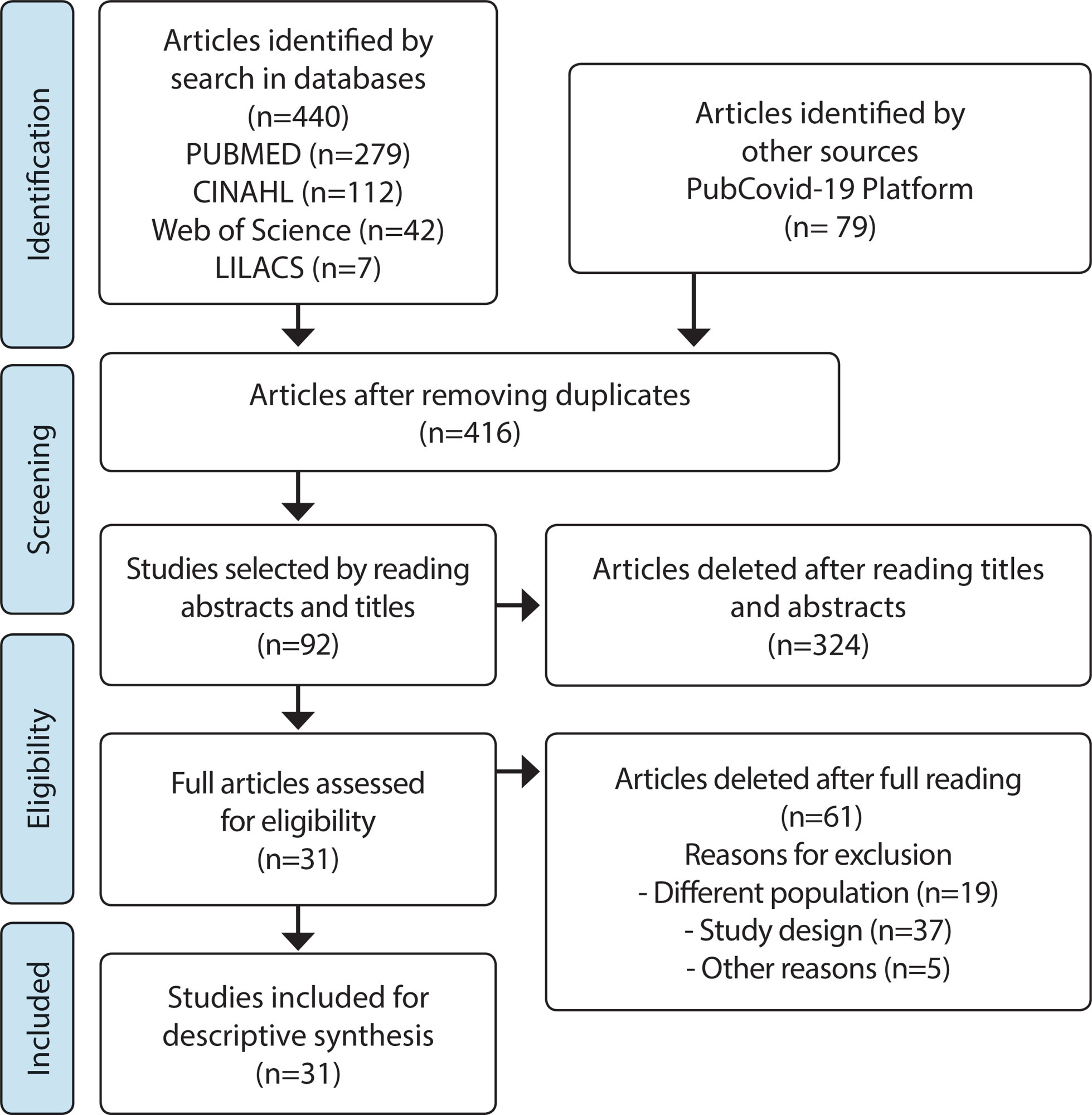-
ORIGINAL ARTICLE
Factors associated with COVID-19 death in pregnant women hospitalized in Intensive Care Units
Revista Brasileira de Enfermagem. 2024;77(5):e20230172
08-26-2024
Resumo
ORIGINAL ARTICLEFactors associated with COVID-19 death in pregnant women hospitalized in Intensive Care Units
Revista Brasileira de Enfermagem. 2024;77(5):e20230172
08-26-2024DOI 10.1590/0034-7167-2023-0172
Visualizações0ABSTRACT
Objectives:
to evaluate the factors associated with COVID-19 death in pregnant women hospitalized in Intensive Care Units in Brazil.
Methods:
this ecological study was conducted using secondary data from Brazilian pregnant women with COVID-19 hospitalized in Intensive Care Units between March 2020 and March 2022. Univariate analysis and logistic regression were employed.
Results:
out of 3,547 pregnant women with COVID-19 hospitalized in Intensive Care Units, 811 died (22.8%). It was found that lack of COVID-19 vaccination (OR: 2.73; 95% CI: 1.83; 4.04), dyspnea (OR: 1.73; 95% CI: 1.17; 2.56), obesity (OR: 1.51; 95% CI: 1.05; 2.17), chronic cardiovascular disease (OR: 1.65; 95% CI: 1.14; 2.38), and non-white race/color (OR: 1.29; 95% CI: 1.00; 1.66) were independently and significantly associated with death.
Conclusions:
it is concluded that vaccination status, presence of comorbidities, and clinical and ethnic-racial characteristics are associated with COVID-19 death in pregnant women hospitalized in Intensive Care Units in Brazil.
Palavras-chave: COVID-19Intensive Care UnitMaternal MortalityPregnant WomenSevere Acute Respiratory SyndromeVer mais -
ORIGINAL ARTICLE
Social and territorial inequalities in the mortality of children and adolescents due to COVID-19 in Brazil
Revista Brasileira de Enfermagem. 2022;75(6):e20210482
08-08-2022
Resumo
ORIGINAL ARTICLESocial and territorial inequalities in the mortality of children and adolescents due to COVID-19 in Brazil
Revista Brasileira de Enfermagem. 2022;75(6):e20210482
08-08-2022DOI 10.1590/0034-7167-2021-0482
Visualizações0ABSTRACT
Objective:
To analyze the mortality rate of COVID-19 among children and adolescents aged 0 to 14 years.
Methods:
Ecological and exploratory study of children’s mortality rate by COVID-19 in Brazil, from February to October 2020. The study used the Severe Acute Respiratory Syndrome database to collect the data and made the analysis using descriptive spatial statistics by age and race/color classification.
Result:
The mortality rate due to COVID-19 represented 1.34 deaths per one hundred thousand in the total group evaluated. The age group with the highest frequency and mortality rate was 1 to 4 years of age. There is a higher frequency of deaths in the brown and Indigenous population.
Conclusion:
The distribution of deaths due to COVID-19 is unequal in the national territory, and there is a wide variation in the mortality rate by age and race/color groups.
Palavras-chave: Coronavirus InfectionsEpidemiologyMortalityPediatric NursingSevere Acute Respiratory SyndromeVer mais
-
EXPERIENCE REPORT
Implementation of care for the use of the extracorporeal oxygenation membrane in the COVID-19 pandemic
Revista Brasileira de Enfermagem. 2021;74(suppl 1):e20200870
04-14-2021
Resumo
EXPERIENCE REPORTImplementation of care for the use of the extracorporeal oxygenation membrane in the COVID-19 pandemic
Revista Brasileira de Enfermagem. 2021;74(suppl 1):e20200870
04-14-2021DOI 10.1590/0034-7167-2020-0870
Visualizações0ABSTRACT
Objective:
To report the experience of a quaternary care center on the implementation of a care program for patients with severe hypoxemic respiratory failure due to SARS-CoV-2 requiring an extracorporeal oxygenation membrane.
Method:
This is an experience report with a descriptive approach, analyzing the use of the extracorporeal oxygenation membrane in a quaternary care center in the city of Rio de Janeiro.
Results:
The planning for the use of the extracorporeal oxygenation membrane included training with the professionals and use of the components related to the adaptation of the protocol, equipment, facilities, quality and safety.
Final Considerations:
Planning, resource allocation and regular training of the team to offer complex interventions, in line with recommendations for good practices in the care for patients with pulmonary complications related to the new coronavirus were essential for the development of the action plan for the use of extracorporeal oxygenation membrane in this pandemic period.
Palavras-chave: Coronavirus InfectionsExtracorporeal Membrane OxygenationPandemicsPlanningSevere Acute Respiratory SyndromeVer mais -
REVIEW
Scientific knowledge about infections by the new coronavirus in older adults: a scoping review
Revista Brasileira de Enfermagem. 2021;74(suppl 1):e20200938
04-14-2021
Resumo
REVIEWScientific knowledge about infections by the new coronavirus in older adults: a scoping review
Revista Brasileira de Enfermagem. 2021;74(suppl 1):e20200938
04-14-2021DOI 10.1590/0034-7167-2020-0938
Visualizações0ABSTRACT
Objective:
to map the scientific knowledge about COVID-19 in older adults.
Method:
this is a scoping review literature review. A search was performed in the PubMed, CINAHL, Web of Science and LILACS databases. Original articles that answered the guiding question were included: what scientific knowledge is available in the world about COVID-19 in older adults?
Results:
thirty-one articles were included, most of them carried out in China (n=23) and with a retrospective design (n=13) and case studies/case series (n=13). Based on the findings, six thematic categories emerged: clinical signs and symptoms (n=12), other information (n=9), adverse outcomes/complications resulting from COVID-19 (n=8), age relationship and greater severity of COVID-19 (n=8), variables related to death by COVID-19 (n=8), and diagnostic findings (n=8).
Conclusion:
the findings reinforce older adults’ greater vulnerability to the worsening of COVID-19, as well as to complications resulting from the disease, including the greater occurrence of death.
Palavras-chave: AgedCoronavirusCoronavirus InfectionsGeriatric NursingSevere Acute Respiratory SyndromeVer mais



